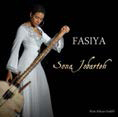Fasiya
Author: Nigel Williamson
View album and artist detailsAlbum and Artist Details
Artist/band: |
Sona Jobarteh |
Label: |
African Guild |
Magazine Review Date: |
Nov/Dec/2011 |
Breaking the mould of West Africa's male– dominated kora tradition, Sona Jobarteh comes from a Mande griot family representing a long line of hereditary musicians, but is the first female virtuoso on the instrument. She is also a fine singer with a classic jelimuso voice, and she studied cello, piano and harpsichord at the Royal College of Music. Fasiya is essentially an elegant, West African pop album, which bridges her African heritage and her European training. If it brings to mind her cousin, Toumani Diabaté, then it's closer in style to his Symmetric Orchestra outings than his classical solo kora work on The Mande Variations. Perhaps the most apt comparison is with the mature work of Rokia Traoré on her 2008 album Tchamantché, a recording that won a Songlines Music Award.
The album opens with Jobarteh's take on ‘Jarabi’, a tune made famous by Toumani, on which her rippling kora and mesmerising vocals are underpinned by throbbing bass and drums and the fluid electric guitar of Sankung Jobarteh. The track sets the tone and mood for the album, although there is plenty of rhythmic and melodic variation to keep boredom at bay. On several tracks Sona abandons the kora for acoustic guitar, such as ‘Musow’, an African ballad of haunting loveliness, and ‘Gainaako’, which features the seemingly ubiquitous Juldeh Camara on his extraordinary ritti (one-string fiddle). ‘Saya’ is a slow, elegiac minor-key piece which soars heavenwards on the divine Fulani flute playing of Baba Galle Kanté.

